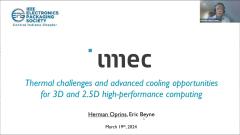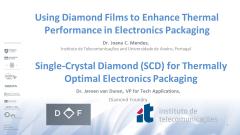(20:43 + Q&A) - Prof. Xuejun Fan, Lamar University
This talk discusses a potential solution to reduce the baking time for moisture-sensitive packages prior to dry pack. The concept is based on consideration of the continuous drying process for a package within moisture barrier bags (MBB), which contain a desiccant. We will use a 2.5D package as an example for a worst-case scenario simulation through finite element modeling. It shows that after 4 weeks of storage at room temperature in the MBB, the residual moisture weight decreases to less than 1%, and the maximum saturated moisture concentration decreases to less than 5% of the saturated moisture concentration. Depending upon package construction, storage conditions and storage time before customer opening of MBB, the study suggests that MBB potentially permits the bake schedule to be shortened.
Xuejun Fan is a Regents’ Professor of Texas State University System, and a Mary Ann and Lawrence E. Faust Endowed Professor at Lamar University, Beaumont, Texas. Dr. Fan is an IEEE Fellow, and an IEEE Distinguished Lecturer. He gave a pre-symposium tutorial a week ago on Reliability Physics and Failure Mechanisms in Electronics Packaging. The video has been posted: https://r6.ieee.org/scv-eps/?p=2983
For videos/slides from other talks at the Symposium on Reliability of Electronics and Photonics Packaging (REPP'22), please visit our website and join our IEEE Dlist: attend.ieee.org/repp
(20:43 + Q&A) - Prof. Xuejun Fan, Lamar University
This talk discusses a potential solution to reduce the baking time for moisture-sensitive packages prior to dry pack. The concept is based on consideration of the continuous drying process for a package within moisture barrier bags (MBB), which contain a desiccant. We will use a 2.5D package as an example for a worst-case scenario simulation through finite element modeling. It shows that after 4 weeks of storage at room temperature in the MBB, the residual moisture weight decreases ...
 Cart
Cart Create Account
Create Account Sign In
Sign In





